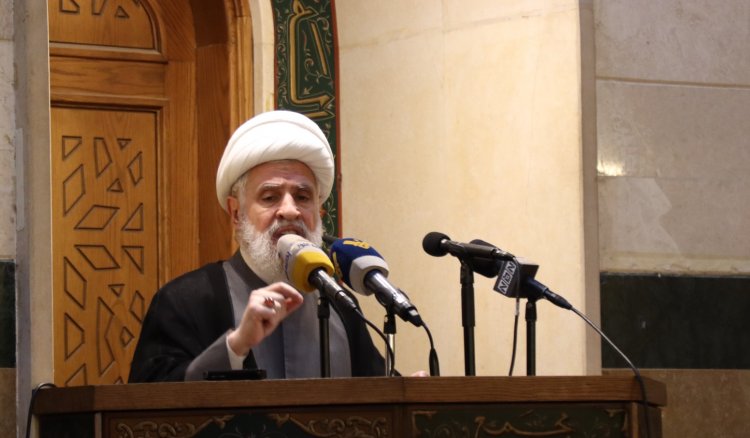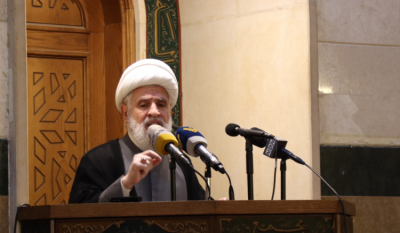Na'im Qassem, the Deputy Secretary-General of Hezbollah, confirmed in an interview with Sputnik Radio that the resilience of the Palestinian 'resistance' and the Palestinian people for more than nine months has thwarted all the objectives of the Israeli army announced since the beginning of its aggression on Gaza. He stated, "Gaza has been under attack for nine months, and from the start, the Israeli army believed that this war could be resolved within three months with an Israeli victory, crushing the Hamas movement and freeing hostages and prisoners." He pointed out that "the steadfastness of the Palestinian people and their significant sacrifices, which exceeded 130,000 to 140,000 'martyrs' and wounded in the face of the genocide and starvation with U.S. and European support, have led the Israeli entity to a dead end."
Qassem noted that the announcement by the Israeli army of the commencement of the third phase of military operations in Rafah is merely evidence of this army's failure to achieve its objectives. Therefore, after reaching a dead end, the Israelis will consider this timing appropriate to conclude an agreement, at which point they will declare that they have finished with Gaza and succeeded in striking Hamas' military infrastructure, and will return to negotiations showing a reduced level of demands, presenting themselves to their people as having achieved an accomplishment in this war.
He stated, "Israel has no choice but to agree to Hamas' conditions because it will not stop 'resisting' if the fire and aggression against civilians do not cease. Thus, the main question today is whether the Israeli army can withstand this attrition, and hence the likelihood of a deal remains strong today, especially given the unrest within Israeli society and the ability of the opposition to pressure Netanyahu, particularly since 67% of the Israeli public believes the prime minister is no longer worthy of continuing in power, not to mention the protests and internal disputes."
Regarding the disagreement between U.S. President Joe Biden and Netanyahu, Qassem said, "There is no disagreement between the two sides on the crimes, genocide, and ending the Palestinian existence, but the difference lies in tactics and methods, as Netanyahu wants to continue his massacres openly, while Biden wants to achieve his goals gradually."
On the impact of Biden's exit from the White House on the Gaza issue, he noted that "external factors do not reflect on this file considering that there are two main factors changing the course of events: first, the resilience of the Palestinian people and their 'resistance'; second, Israel's ability to continue the war of attrition and its reflection on the internal Israeli front."
He expressed the belief that "after the war, Hamas will have a significant role in Palestine contrary to Israeli expectations and desires," indicating that indirect negotiations are ongoing with the movement. Therefore, after a ceasefire, Hamas will be strongly present on the Palestinian political scene and will oversee the implementation of the truce agreement. He argued that these facts have put Israel and the United States in a significant dilemma regarding their options for the day after the war, asserting that "the legendary performance of the Palestinian 'resistance' in Gaza has helped to overcome the stage of Palestinian-Palestinian disputes," questioning "who recognizes the Palestinian Authority today, and who interacts with it from the East and the West."
Qassem pointed out several factors that will contribute to the victory of the Palestinian people: "First, the 'resistance' is the rightful owner of the land that has decided to confront until victory or 'martyrdom'; the second factor is the preparedness of the 'resistance' for this war and its strong will to shape the future; the third factor is the capability of the factions to endure."
He stressed that "the 'resistance' axis does not rely on the role of Arab states in this battle, considering that the Arabs have political options different from the 'resistance,' and thus some have been implicated in normalization while others have been thinking about how to establish agreements with Israel." He clarified that "the current reality indicates that there is an axis comprising forces and states that have decided to confront the Israeli project, with the liberation of Palestine at the top of their priorities. When this goal is achieved, Arab states will remain neutral."
Qassem affirmed, "October 7 flipped the equation in the region, and Palestine has become the world's foremost issue, whereas it was on the brink of extinction. Regarding normalization, it is a secondary factor that will not affect the Palestinian cause, while the influential factor in this file is the success of the resistance in facing Israel."
Regarding Western public opinion and protests at American universities, he stated, "The greatest loss caused by the 'Al-Aqsa Flood' operation is that it revealed the deception of American values, which presented themselves as universal humanitarian values that sanctify rights and justice. Therefore, the West, especially America and Europe, no longer represent the model in universal values as they have supported and funded crimes. Consequently, this Western movement is an indication of a significant change in Western public opinion and a positive point in the history of our struggle against the Israeli army for the sake of our rights and lands."
On the situation in the southern front, specifically concerning the assassination of Hezbollah leaders, Qassem said, "The party announced on October 8 that the southern Lebanon front would be a 'supportive' front, establishing a range of confrontation from three to five kilometers in military, intelligence, and informational terms, in addition to not targeting civilians so far. The further the Israeli army exceeds this range or targets civilians, we are committed to responding appropriately in line with our confrontation plan."
He added, "Hezbollah's conviction is that it will offer sacrifices in this battle, and the Israeli army was not mistaken when it announced that it had hit qualitative targets, while the 'resistance' is hitting qualitative targets, barracks, officers, and spying locations daily, thus our achievements are significant. Often, the Israeli side does not announce the extent of its losses."
He declared that "the prospects for expanding the war are not available in the near future, but Hezbollah is prepared for the worst scenarios," explaining that "the party does not base its military stance on political analyses but on information and battlefield results."
Qassem directed a message to the Lebanese interior, stating, "Those dreaming within Lebanon of a war to annoy or weaken Hezbollah will see disturbing dreams as reality does not depend on their perceptions, and they have no effect on the ground. There is a strong 'resistance' confronting the Israeli enemy that will triumph, and they will be even more annoyed."
He clarified that "the 'victory of the resistance' divides into two types: indirect victory, which includes preventing the enemy from achieving its goals, stopping its expansion, and preventing Israel from annihilating the resistance; the second type is direct victory, i.e., the resistance's ability to endure, liberate the land, enhance deterrence capability, and protect the Lebanese interior from any Israeli military operations. All these goals have been achieved, as since 2006 until 2023, for 17 years, the Israeli army has been deterred, and Hezbollah has increased its strength, in addition to assisting the Lebanese state in border demarcation."
Regarding maritime border demarcation, Qassem remarked, "Two matters must be separated in this file. The first concerns the recognition by the Israeli entity of the Lebanese maritime borders and Lebanon's right to extract these resources. The second relates to the fact that extraction from the Karish field began before the maritime borders were demarcated, and the Lebanese path cannot be equated with the Israeli path in this regard, considering that the agreement with the concerned companies has not been completed, not to mention doubts surrounding these companies' performance." He affirmed that "this file needs to be addressed and will be seriously worked on after concluding the Gaza war."
Concerning Resolution 1701, Qassem saw that "foreign envoys, especially from the American and French sides, want to discuss the resolution and wish to separate the southern Lebanon front from the Gaza front, trying to make arrangements that please Israel so it can return settlers to their places. However, the 'resistance's' answer to all envoys was unified: no discussion without a ceasefire, after which political discussions about the latest developments can occur."
Qassem addressed the situation within Lebanon, placing "the opposing opinions regarding the supportive front within the framework of freedom of expression, stating that they expressed their views, and we expressed ours, and it is up to the people to decide." He also talked about Hezbollah's relationship with the Free Patriotic Movement, announcing that "the understanding is contingent on certain issues and positions that need to be addressed, but the alliance has not ended definitively or been reactivated. When MP Gebran Bassil rejects the supportive front, he expresses his opinion; we, in turn, express our views and fulfill our duties."
As for the presidential election file, Qassem indicated that "his team announced their candidate for the presidency, Suleiman Frangieh, who realizes the national goals of all parties and is acceptable to Arab countries," asserting that the disagreement over "the presidency is very large, especially with the significant fragmentation among the Lebanese parliamentary blocs, in addition to the structure of the Lebanese Parliament, which has made all parties equal in the council, where no party can impose its candidate. Therefore, the only solution remains dialogue to dispel the concerns of the parties, and we present evidence."
In conclusion, Qassem summarized the visit of the German intelligence delegation as "a visit for exchanging ideas, with an in-depth discussion among the attendees regarding the latest developments."




